AWM41 1052 - [Nurses Narratives] M R Thomas
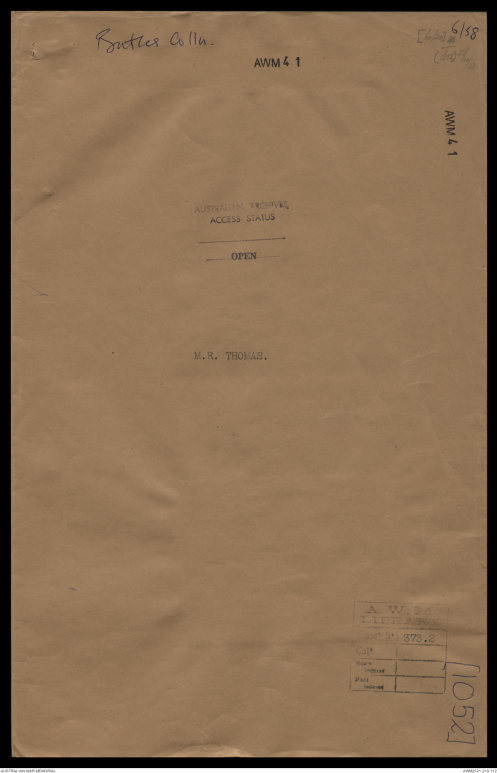
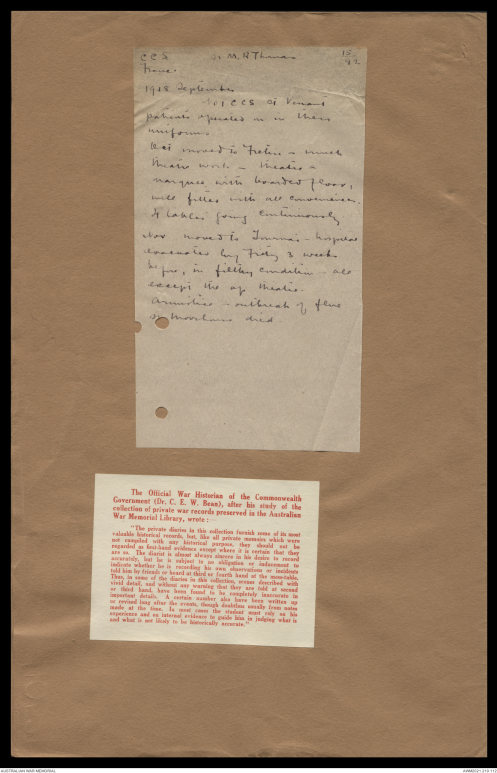
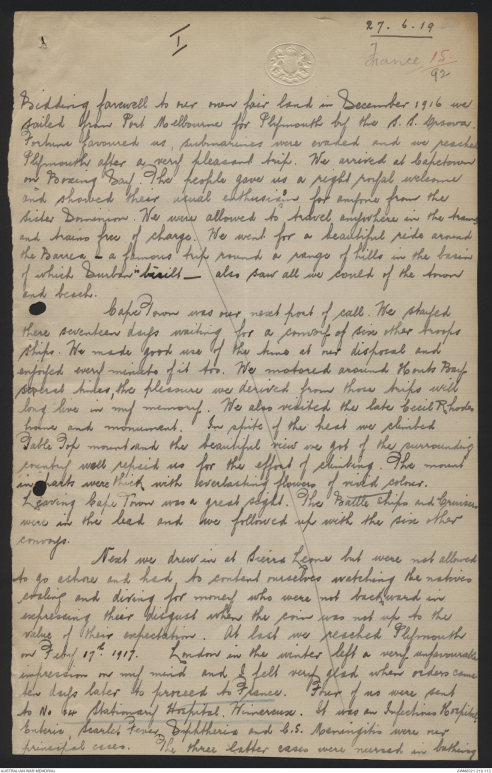
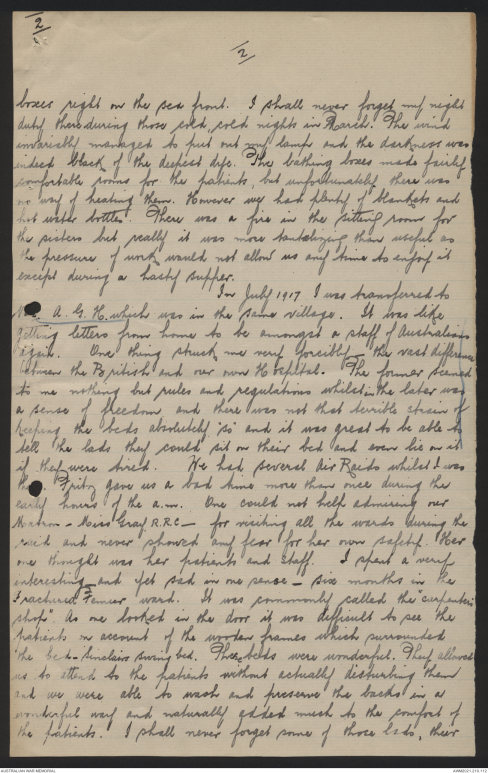
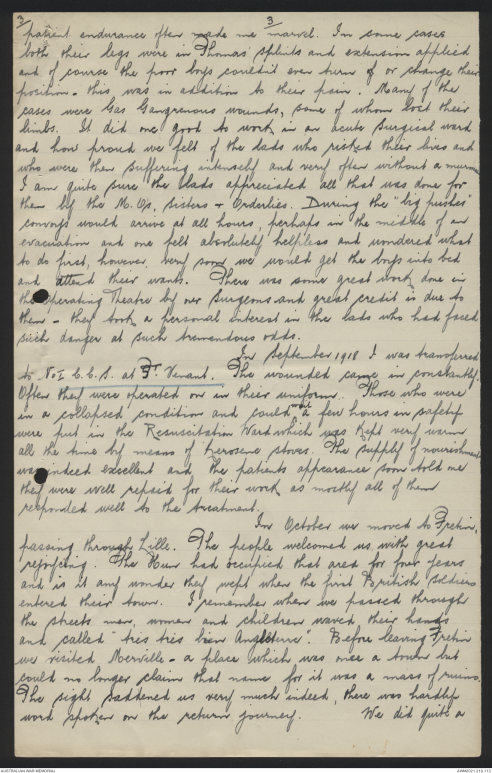
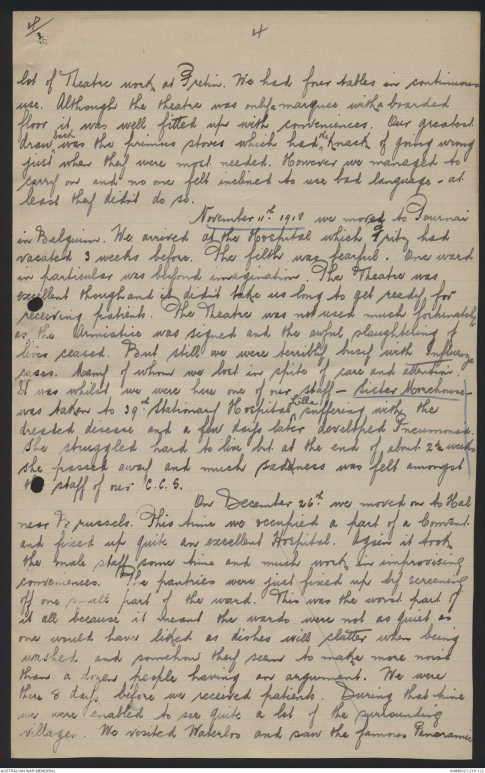
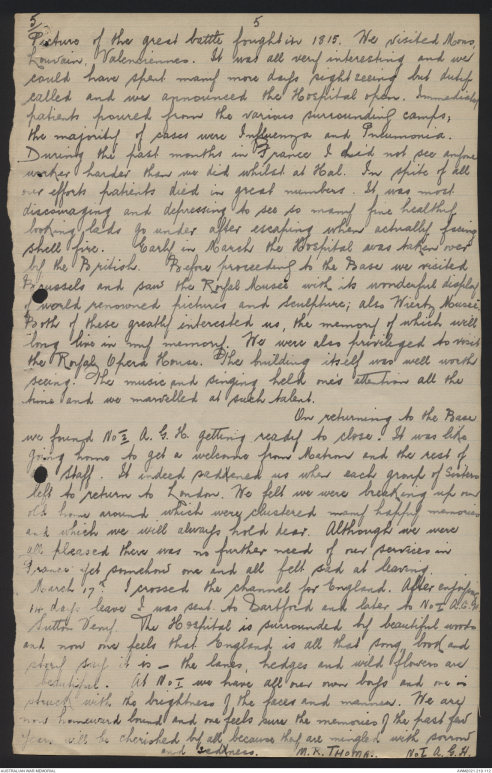
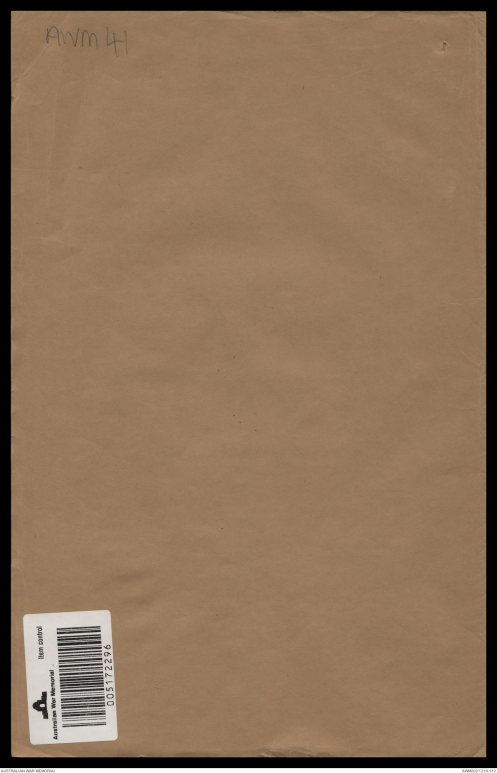
6/58
Butler Colln.
[[(?12) 44 ( 27/10/18]]
AWM 4 1
AWM 4 1
AUSTRALIAN ARCHIVES
ACCESS STATUS
OPEN
M.R. THOMAS.
A.W.M. LIBRARY
373.2
[1052]
C.C.S. Sr M.R. Thomas 15/92
France
1918 September
No 1 CCS St Verant
patients operated on in their
uniforms.
Oct moved to Fretin - much
theatre work - theatre a
marquee with boarded floor,
well filled with all conveniences.
4 tables going continuously
Nov moved to Tournai - hospital
evacuated by Fritz 3 weeks
before, in filthy condition - all
except the op theatre.
Armistice - outbreak of flu
Sr Moorhouse died
The Official War Historian of the Commonwealth
Government (Dr. C. E. W. Bean), after his study of the
collection of private war records preserved in the Australian
War Memorial Library, wrote : -
"The private diaries in this collection furnish some of its most
valuable historical records, but, like all private memoirs which were
not compiled with any historical purpose, they should not be
regarded as first-hand evidence except where it is certain that they
are so. The diarist is almost always sincere in his desire to record
accurately, but he is subject to no obligation or inducement to
indicate whether he is recording his own observations or incidents
told him by friends or heard at third or fourth hand at the mess-table.
Thus, in some of the diaries in this collection, scenes described with
vivid detail, and without any warning that they are told at second
or third hand, have been found to be completely inaccurate in
important details. A certain number also have been written up
or revised long after the events, though doubtless usually from notes
made at the time. In most cases the student must rely on his
experience and on internal evidence to guide him in judging what is
and what is not likely to be historically accurate."
I 1
27.6.19
France 15/92
Bidding farewell to our own fair land in December 1916 we
sailed from Port Melbourne for Plymouth by the S.S. Orsova.
Fortune favoured us, submarines were evaded and we reached
Plymouth after a very pleasant trip. We arrived at Capetown
on Boxing Day. The people gave us a right royal welcome
and showed their usual enthusiasm for anyone from the
Sister Dominion. We were allowed to travel anywhere in the trams
and trains free of charge. We went for a beautiful ride around
the Banca - a famous trip round a range of hills in the basin
of which Durban is built - also saw all we could of the town
and beach.
Cape Town was our next port of call. We stayed
there seventeen days waiting for a convoy of six other troops
ships. We made good use of the time at our disposal and
enjoyed every minute of it too. We motored around Hout Bay
several times, the pleasure we derived from those trips will
long live in my memory. We also visited the late Cecil Rhodes
home and monument. In spite of the heat we climbed
Table Top mount and the beautiful view one got of the surrounding
country well repaid us for the effort of climbing. The mount
in parts were thick with everlasting flowers of vivid colour.
Leaving Cape Town was a great sight. The Battle ships and Cruisers
were in the lead and we followed up with the six other
convoys.
Next we drew in at Sierra Leone but were not allowed
to go ashore and had to content ourselves watching the natives
coaling and diving for money who were not backward in
expressing their disgust when the coin was not up to the
value of their expectation. At last we reached Plymouth
on Febry 17th 1917. London in the winter left a very unfavourable
impression on my mind and I felt very glad when orders came
ten days later to proceed to France. Four of us were sent
to No. 14 Stationary Hospital Wimereux. It was an Infectious Hospital
Enteric, Scarlet Fever, Diphtheria and C.S. Meningitis were our
principal cases. The three latter cases were nursed in bathing
2
2
boxes right on the sea front. I shall never forget my night
duty there during those cold, cold nights in March. The wind
invariably managed to put out my lamp and the darkness was
indeed black of the deepest dye. The bathing boxes made fairly
comfortable rooms for the patients, but unfortunately there was
no way of heating them. However we had plenty of blankets and
hot water bottles. There was a fire in the sitting room for
the sisters but really it was more tantalizing than useful as
the pressure of work would not allow as any time to enjoy it
except during a hasty supper.
In July 1917 I was transferred to
No 2 A.G.H. which was in the same village. It was like
getting letters from home to be amongst a staff of Australians
again. One thing struck me very forcibly - the vast difference
between the British and our own Hospital. The former seemed
to me nothing but rules and regulations whilst in the later was
a sense of freedom and there was not that terrible strain of
keeping the beds absolutely "so" and it was great to be able to
tell the lads they could sit on their bed and even lie on it
if they were tired. We had several Air Raids whilst I was
there. Fritz gave us a bad time more than once during the
early hours of the a.m. One could not help admiring our
Matron - Miss Gray R.R.C. - for visiting all the wards during the
raid and never showed any fear for her own safety. Her
one thought was her patients and staff. I spent a very
interesting - and yet sad in one sense - six months in the
fractured Femur ward. It was commonly called the "carpenters'
shop". As one looked in the door it was difficult to see the
patients on account of the wooden frames which surrounded
the beds - Sinclairs swing bed. These beds were wonderful. They allowed
us to attend to the patients without actually disturbing them
and we were able to wash and preserve the backs in a
wonderful way and naturally added much to the comfort of
the patients. I shall never forget some of those lads, their
3
3
patient endurance often made me marvel. In some cases
both their legs were in Thomas' splints and extension applied
and of course the poor boys couldn't even turn of or change their
position - this was in addition to their pain. Many of the
cases were Gas Gangrenous wounds, some of whom lost their
limbs. It did me good to work in an acute Surgical ward
and how proud we felt of the lads who risked their lives and
who were then suffering intensely and very often without a murmur
I am quite sure the lads appreciated all that was done for
them by the M.O's., Sisters & Orderlies. During the "big pushes"
convoys would arrive at all hours, perhaps in the middle of an
evacuation and one felt absolutely helpless and wondered what
to do first, however, very soon we would get the boys into bed
and attend their wants. There was some great work done in
the Operating Theatre by our Surgeons and great credit is due to
them - they took a personal interest in the lads who had faced
such danger at such tremendous odds.
In September 1918 I was transferred
to No 1 C.C.S. at St. Venant. The wounded came in constantly.
Often they were operated on in their uniform. Those who were
in a collapsed condition and could not wait a few hours in safety
were put in the Resuscitation Ward which was kept very warm
all the time by means of kerosene stoves. The supply of nourishment
was indeed excellent and the patients appearance soon told me
they were well repaid for their work as mostly all of them
responded well to the treatment.
In October we moved to Fretin,
passing through Lille. The people welcomed us with great
rejoycing. The Huns had occupied that area for four years
and is it any wonder they wept when the first British Soldiers
entered their town. I remember when we passed through
the streets men, women and children waved their hands
and called "tres tres bien Angleterre". Before leaving Fretin
we visited Merville - a place which was once a town but
could no longer claim that name for it was a mass of ruins.
The sight saddened us very much indeed, there was hardly
word spoken on the return journey. We did quite a
4
4
lot of Theatre work at Fretin. We had four tables in continuous
use. Although the theatre was only a marquee with boarded
floor it was well fitted up with conveniences. Our greatest
draw ^back was the primus stoves which had ^the knack of going wrong
just when they were most needed. However we managed to
carry on and no one felt inclined to use bad language - at
least that didn't do so.
November 11th 1918 we moved to Tournai
in Belgium. We arrived of the hospital which Fritz had
vacated 3 weeks before. The filth was fearful. One ward
in particular was beyond imagination. The Theatre was
excellent though and it didn't take us long to get ready for
receiving patients. The Theatre was not used much fortunately
as the Armistice was signed and the awful slaughtering of
lives ceased. But still we were terribly busy with Influenza
cases. Many of whom we lost in spite of care and attention.
It was whilst we were here one of our staff - Sister Morehouse -
was taken to 29th Stationary Hospital Lille suffering with the
dreaded disease and a few days later developed Pneumonia.
She struggled hard to live but at the end of about 2½ weeks
she passed away and much saddness was felt amongst
the staff of our C.C.S.
On December 26th we moved on to Hal
near Brussels. This time we occupied a part of a Convent
and fixed up quite an excellent Hospital. Again it took
the male staff some time and much work in improvising
conveniences. The pantries were just fixed up by screening
off one small part of the ward. This was the worst part of
it all because it meant the wards were not as quiet as
one would have liked as dishes will clatter when being
washed and somehow they seem to make more noise
than a dozen people having an argument. We were
there 8 days before we received patients. During that time
we were enabled to see quite a lot of the surrounding
villages. We visited Waterloo and saw the famous Panoramic
5
5
Picture of the great battle fought in 1815. We visited Mons,
Louvain, Valenciennes. It was all very interesting and we
could have spent many more days sight seeing but duty
called and we announced the Hospital open. Immediately
patients poured from the various surrounding camps,
the majority of cases were Influenza and Pneumonia.
During the past months in France I did not see anyone
worker harder than we did whilst at Hal. In spite of all
our efforts patients died in great numbers. It was most
discouraging and depressing to see so many fine healthy
looking lads go under after escaping when actually facing
shell fire. Early in March the Hospital was taken over
by the British. Before proceeding to the Base we visited
Brussels and saw the Royal Musee with its wonderful display
of world renowned pictures and sculpture; also Wiertz Musee.
Both of these greatly interested us, the memory of which will
long live in my memory. We were also privileged to visit
the Royal Opera House. The building itself was well worth
seeing. The music and singing held one's attention all the
time and we marvelled at such talent.
On returning to the Base
we found No 2 A.G.H. getting ready to close. It was like
going home to get a welcome from Matron and the rest of
the Staff. It indeed saddened us when each group of Sisters
left to return to London. We felt we were breaking up our
old home around which were clustered many happy memories
and which we will always hold dear. Although we were
all pleased there was no further need of our services in
France yet somehow one and all felt sad at leaving.
March 17th I crossed the channel for England. After enjoying
14 days leave I was sent to Dartford and later to No 1 A.G.H.
Sutton Veny. The Hospital is surrounded by beautiful woods
and now one feels that England is all that song, book and
story say it is - the lanes, hedges and wild flowers are
beautiful. At No 1 we have all our own boys and one is
struck with the brightness of the faces and manner. We are
now homeward bound and one feels sure the memories of the past few
years will be cherished by all because they are mingled with sorrow
and saddness. M.R. THOMAS. No 1 A.G.H.
AWM 41
Item control
Australian War Memorial
005172296
 Sam scott
Sam scottThis transcription item is now locked to you for editing. To release the lock either Save your changes or Cancel.
This lock will be automatically released after 60 minutes of inactivity.